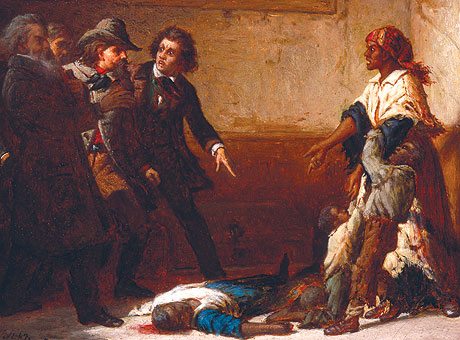Toni Morrison’s novel “Beloved” is tragic story which explores the repercussions of sexual interactions. Throughout the novel, countless recollections to rape and sex showcase much of the internal thoughts and development of a character. Interactions between characters are illuminated in a dark light. Likewise, sex in society today is referred to as taboo, not socially acceptable to talk about. Similarly, slavery isn't spoken upon casually, only taught briefly. So it's not a surprise that the two intertwine within the novel. Sex in the novel awakens memories of slavery a character had previously subsided, and brings them back to haunt them.
Ultimately, Sethe, the main protagonist of the novel, is scared the most. Back in Sweet Home, the plantation which she escaped from, Sethe’s rape incident had traumatized her for life. This would eventually lead her to commit the atrocious act of killing her baby, Beloved. Sethe’s recollection of being raped, justified her action when her supposed slave owner came to reclaim Sethe and her family. Most people who criticize her decision, might never known what it must have been like to be in her shoes; at both the time of killing her baby, and when she was being raped. Sethe weighted the outcomes, and decided death was far better than the possibility of her children being rapped and enslaved for life. That was ID working in her head. ID is one of three components for three parts of the human personality which is a part of Sigmund Freud’s psychoanalytic personality theory. According to Freud, it’s the explanation for human behavior. ID is basic gratification and in this case it was to relieve her children of the burned which is rape by a white man.
Later on, Sethe overcomes her trauma and in doing so, her way of thinking shifts from ID to Ego. The scenario is recreated again and in defending Beloved she adds reality into her decision. She faces the threat head on but fails to add morals to her rational. She satisfies the need to relieve her children by trying to kill the supposed slave owner. If Sethe defended Beloved using a more peaceful approach her way of thinking would be Super Ego, which is based on judgments of good and bad. Killing would be extremely bad so Sethe isn't quite at that level, and never quite is at the end of the story. In the article, “Figurations of Rape and the Supernatural in Beloved”, Pamela E. Barnett shares similar ideas. She explains how rape was used to “dehumanize enslaved persons” and used to “physical[ly] and psychological[ly]” scar black people. And would eventually torment them throughout their lives. The biggest example of this would be Sethe, as she is haunted by her memories at Sweet Home.
Paul D is another character whose memories come flowing back to him because of sex. For Paul, Beloved was the “catalyst” which made him remember his years enslaved. Beloved "reminds me of something; something, look like, I'm supposed to remember". Although Paul doesn't directly say he was reminded about his years enslaved and his experience being raped, it's inferred by the reader because, like Sethe, Paul D once lived on the same plantation s Sethe. For Paul D, his experience at sweet home left him with a tin heart and ripped away his masculinity and pride he had. Overall, it may be said that rape, or any traumatic moment for that matter, will forever plague someone and make them feel less of a person.









